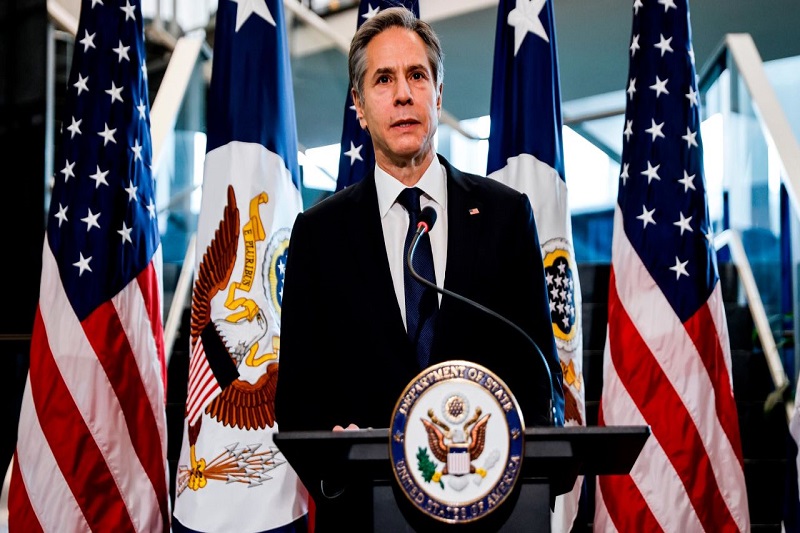During a trip that showed the longtime allies were getting along better after a fight, US Secretary of State Antony Blinken was cautiously optimistic about keeping the peace. On Wednesday, he asked Ethiopia to make sure that people were held responsible for the brutal Tigray conflict, but he was cautiously optimistic about keeping the peace. During the last trip to Africa by a high-level US official, Blinken offered $331 million in new humanitarian aid. However, he didn’t support Ethiopia’s readmission to a major trade pact. This occurred while China and Russia are making inroads on the continent.
The top US diplomat said that expanding economic ties with Ethiopia was dependent on the African country’s commitment to “reconciliation and accountability” about the conflict, which the US says has killed about 500,000 people. After a day of meetings, Blinken told reporters, “Getting to justice, bringing people together, that’s the way to make sure that peace lasts, that people can move on with their lives, and that the country can really move forward.” “Getting to justice” refers to the process of bringing criminals to justice. “Bringing people together” refers to the process of bringing individuals together.
Related Posts
After Blinken’s accusations that crimes against humanity had been committed during the war, he had a meeting with Prime Minister Abiy Ahmed that lasted for an unusually lengthy two and a half hours. Blinken’s accusations had angered Abiy Ahmed. Blinken also met with representatives of the Tigray People’s Liberation Front (TPLF), and he reported that both parties expressed commitments to implementing the peace accord that was mediated in South Africa by the African Union with assistance from the United States.
Since the agreement was reached, he has also met with representatives of human rights organizations, who told him that there has been “a very significant drop in human rights violations and abuses in Tigray.” “That does not mean that they have been eliminated,” Blinken said, “and we, in fact, strongly urge all parties to the conflict to do everything possible to ensure that they cease completely.”
The meeting between Abiy and Blinken was closed to the press, but Abiy later wrote on Twitter that he and Blinken had agreed to “strengthen the longstanding bilateral relations (between) our countries with a commitment to partnership.” Blinken said that more than $331 million in humanitarian aid would be sent to Ethiopia. The southern and southeastern parts of Ethiopia are going through their worst drought on record.
As Blinken was touring a United Nations logistics hub in Addis Ababa for food relief, he made the following statement: “This funding will provide life-saving support to those who have been displaced and affected by conflict, drought, and food insecurity in Ethiopia.” According to Blinken’s statements to the press, the newest assistance, which brings the total amount of US humanitarian assistance to Ethiopia to more than $780 million in the US fiscal year 2023, is designed “for everyone, not one group or region.”
“We want to make sure that anyone who is in need receives the assistance that they require.” Blinken walked by sacks of wheat that Ukraine had given him. On the sacks was the flag of the country that had been invaded. This happened as Washington was putting pressure on Russia to renew a grain export deal. The United States had contributed split peas and vegetable oil, and Ukraine had gifted wheat.
Abiy, who won the Nobel Peace Prize, was once seen as the leader of a new generation of forward-thinking African leaders. However, because of the conflict in Tigray, his reputation in Washington has taken a hit. The TPLF, which used to control Ethiopian politics, attacked military installations. This led Abiy’s government, with help from Ethiopia’s neighbor Eritrea, to launch a major offensive. The violence erupted when the TPLF attacked the military installations.
The Tigray People’s Liberation Front (TPLF) came dangerously close to marching on the capital city of Addis Ababa before being pushed back by pro-Abiy troops and agreeing to disarm as part of the November agreement. Even though the media can’t see what’s going on on the ground because of restrictions, Abiy has promised to bring back essential services to the war-torn region of Tigray.
Human Rights Watch and Amnesty International have both asked Blinken to push for the peace deal to be fully carried out and for those who broke the rules in the past to be held accountable. “Failure to do so will send a signal to perpetrators everywhere that the US will not stand up for justice,” said Kate Hixon, who serves as the advocacy director for Amnesty International’s Africa program.
The United States thinks that more people have died in the conflict in Tigray than in Russia’s invasion of Ukraine, which has gotten a lot more attention from the rest of the world than the conflict in Tigray. Moscow has stepped up its diplomatic efforts across Africa, including in Ethiopia, in the hopes that the continent will not join the sanctions that the West has put in place against it and instead stay neutral.
China has been making progress in Africa for years, and it has helped African leaders build relationships that aren’t affected by human rights pressure from the West. Russia’s efforts come after China’s successes in Africa.

